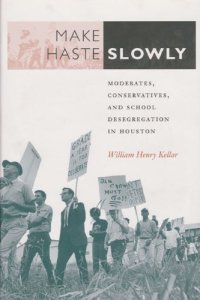
Ebook: Make Haste Slowly: Moderates, Conservatives, and School Desegregation in Houston
Author: William Henry Kellar
- Tags: State & Local, United States, Americas, History, African-American Studies, Specific Demographics, Social Sciences, Politics & Social Sciences, Civil Rights & Liberties, Specific Topics, Politics & Government, Politics & Social Sciences, Administration, Education Theory, Schools & Teaching, Education & Teaching, History, Education Theory, Schools & Teaching, Education & Teaching
- Series: Centennial Series of the Association of Former Students Texas A&M University
- Year: 1999
- Publisher: Texas A&M University Press
- Edition: 1st
- Language: English
- pdf
When faced by the Court-ordered all deliberate speed” time frame for school desegregation, a fearful Houston school board member urged the city to make haste slowly,” in order for the school system to receive decisions based on sound judgment and discretion.
Houston, Texas, had what may have been the largest racially segregated Jim Crow” public school system in the United States when the Supreme Court declared the practice unconstitutional in 1954. Ultimately, helped by members of its business community, Houston did desegregate its public schools and did so peacefully, without making the city a battleground of racial violence.
In Make Haste Slowly, William Henry Kellar provides the first extensive examination of the development of Houston’s racially segregated public school system, the long fight for school desegregation, and the roles played by various community groups, including the HISD Board of Education, in one of the most significant stories of the civil rights era.
Drawing on archival records, HISD School Board minutes, interviews with participants in the process, the oral history collection of the Houston Metropolitan Research Center, and a variety of other sources, Kellar constructs a detailed account of the development of Houston’s segregated public school system and the struggle of Houston’s African American community against the Number Eighty:The Centennial Series of the Association of Former Students, Texas A&M University
oppression of racial discrimination in the city.
Kellar shows that, while Houston desegregated its public school system peacefully, the limited integration that originally occurred served only to delay equal access to HISD schools. Houstonians shifted from a strategy massive resistance” to one of massive retreat.” White flight and resegregation transformed both the community and its public schools.
Kellar concludes that forty years after the Brown decision, many of the aspirations that landmark ruling inspired have proven elusive, but the impact of the ruling on Houston has changed the face of that city and the nature of its public education dramatically and in unanticipated ways.
Make Haste Slowly fills a longtime void in the literature on the civil rights era in Texas. Those interested in Texas history and African American history will find this book essential to understanding one of the most reactionary periods in American history.
Houston, Texas, had what may have been the largest racially segregated Jim Crow” public school system in the United States when the Supreme Court declared the practice unconstitutional in 1954. Ultimately, helped by members of its business community, Houston did desegregate its public schools and did so peacefully, without making the city a battleground of racial violence.
In Make Haste Slowly, William Henry Kellar provides the first extensive examination of the development of Houston’s racially segregated public school system, the long fight for school desegregation, and the roles played by various community groups, including the HISD Board of Education, in one of the most significant stories of the civil rights era.
Drawing on archival records, HISD School Board minutes, interviews with participants in the process, the oral history collection of the Houston Metropolitan Research Center, and a variety of other sources, Kellar constructs a detailed account of the development of Houston’s segregated public school system and the struggle of Houston’s African American community against the Number Eighty:The Centennial Series of the Association of Former Students, Texas A&M University
oppression of racial discrimination in the city.
Kellar shows that, while Houston desegregated its public school system peacefully, the limited integration that originally occurred served only to delay equal access to HISD schools. Houstonians shifted from a strategy massive resistance” to one of massive retreat.” White flight and resegregation transformed both the community and its public schools.
Kellar concludes that forty years after the Brown decision, many of the aspirations that landmark ruling inspired have proven elusive, but the impact of the ruling on Houston has changed the face of that city and the nature of its public education dramatically and in unanticipated ways.
Make Haste Slowly fills a longtime void in the literature on the civil rights era in Texas. Those interested in Texas history and African American history will find this book essential to understanding one of the most reactionary periods in American history.
Download the book Make Haste Slowly: Moderates, Conservatives, and School Desegregation in Houston for free or read online
Continue reading on any device:

Last viewed books
Related books
{related-news}
Comments (0)